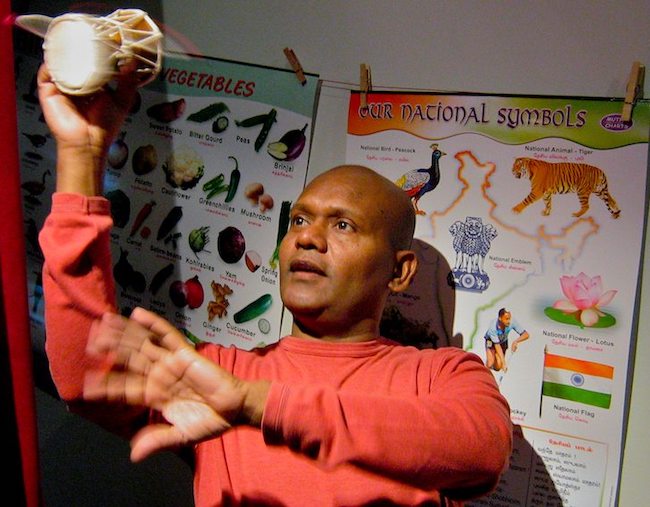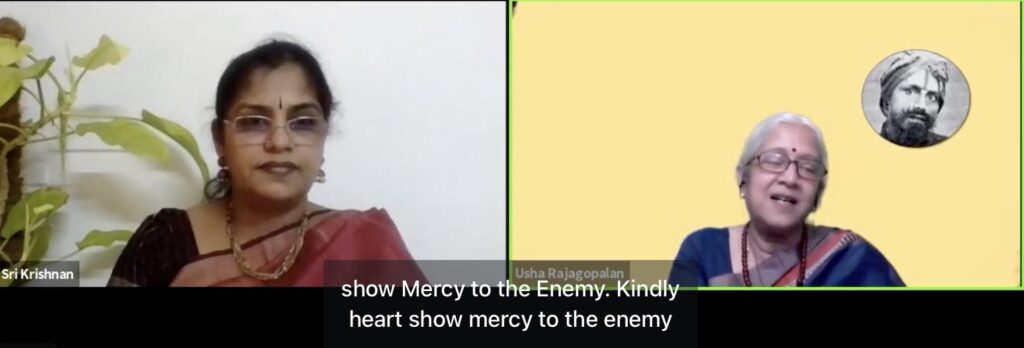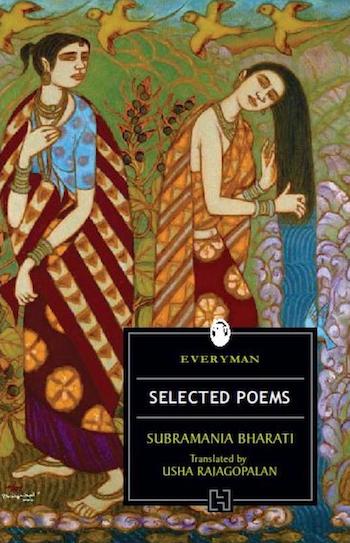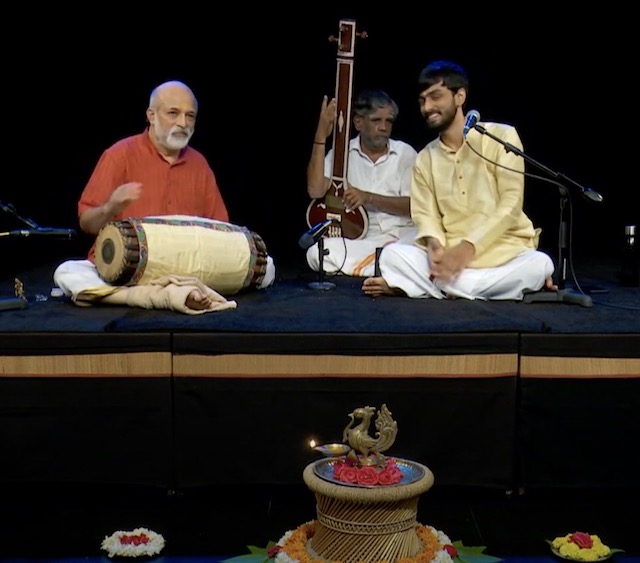Gudu Gudu makes wonderful listening, time and again. A rendition by Sreevidhya Chandramouli along with her husband and son as part of their ongoing KaraikudiVoyage.
This song encapsulates the healing power of music waiting to be brought into practice on a more regular base for being rooted in tradition at its very best.
Tips: 1. Search inside this file by first clicking on the (…) Ellipses icon; 2. click eBook title to access [ ] Toggle fullscreen; 3. to Read this book aloud, use the headphone icon.
Translation on Archive.org
- NEW FORTUNE TELLER (PUDIYA KONANGI)*
by Mahakavi Bharati
Gudu gudu gudu gudu gudu gudu gudu gudu
Happy days ahead for the people!
Caste feelings are no more.
No more are there any conflicts.
Shakti ! Maha Kali! Speak up.
Predict good times for the people of Vedapura !
Poverty is gone.
Prosperity is in.
Knowledge is ushered in.
Sins have vanished in the thin air.
If the educated try to deceive
the simple men, they will be ruined in no time.
Commerce and industry are being learnt.
Workers flourish.
Shastras and skills are being learnt.
Fear is gone. Justice prevails.
The hour of awakening is come.
The magic of incantations is working all around us.
Source: Full text of “Poems Subramania Bharati” (National Council of Educational Research and Training, 1982), pp. 147-151 in the text version provided by Archive.org; and from p. 160 in the embedded version displayed above.
* The fortune teller is traditionally depicted as shaking a small hourglass-shaped drum called kudukuduppai in Tamil, and as damaru across India. Two beads attached to it by strings produce the characteristic rattling “kudu kudu” sound evoked in this poem as harbinger of a bright future for all.

playing the kudukuduppai (damaru) during a family workshop
at Museum Rietberg (Zurich) in 2008
More about the poet Subramanya Bhaaratiyaar (1882-1921)
Bharati was determined to abolish the caste system in India. He selected an untouchable boy, to prove his principle of “equality” to the society.
Some clarifications on caste-related issues by reputed scholars
Understanding “caste” in the context of Indian democracy: The “Poona Pact of 1932”
“Mahatma Gandhi and BR Ambedkar differed over how to address caste inequities through the electoral system. Their exchanges led to the Poona Pact of 1932, which shaped the reservation system in India’s electoral politics. […]
Two prominent figures who have significantly contributed to this discourse are Mahatma Gandhi, Father of the Nation, and Bhimrao Ramji Ambedkar, Father of the Constitution. The two stalwarts of Indian politics, while revered equally by the public, had contrasting views on the caste system. Their subsequent debates have shaped the course of Indian society and politics. While Gandhi denounced untouchability, he did not condemn the varna system, a social hierarchy based on occupation, for most of his life. He believed in reforming the caste system through the abolition of untouchability and by giving equal status to each occupation. On the other hand, BR Ambedkar, a Dalit himself, argued that the caste system disorganised and ‘demoralised Hindu society, reducing it to a collection of castes’. […]
And yet, despite their differences, they developed an understanding to work for the betterment of the marginalised.” – Rishabh Sharma in “How Ambedkar and Gandhi’s contrasting views paved way for caste reservation” (India Today, 6 October 2023)
URL: https://www.indiatoday.in/history-of-it/story/ambedkar-gandhi-caste-system-poona-pact-1932-reservation-2445208-2023-10-06
~ ~ ~
“That upper caste groups should declare themselves to be OBCs [Other Backward Castes] and want to avail of the reservation policy is a pandering to caste politics of course, as also are caste vote-banks. It is partially a reflection of the insecurity that the neo-liberal market economy has created among the middle-class. Opportunities are limited, jobs are scarce and so far ‘development’ remains a slogan. There’s a lot that is being done to keep caste going in spite of saying that we are trying to erode caste. We are, of course, dodging the real issue. It’s true that there has been a great deal of exploitation of Dalit groups and OBC’s in past history; making amends or even just claiming that we are a democracy based on social justice demands far more than just reservations. The solution lies in changing the quality of life of half the Indian population by giving them their right to food, water, education, health care, employment, and social justice. This, no government so far has been willing to do, because it means a radical change in governance and its priorities.” – Romila Thapar (Emeritus Professor of History, Jawaharlal Nehru University) interviewed by Nikhil Pandhi (Caravan Magazine, 7 October 2015)
URL: https://caravanmagazine.in/vantage/discipline-notion-particular-government-interview-romila-thapar
~ ~ ~
“Casteism is the investment in keeping the hierarchy as it is in order to maintain your own ranking, advantage, privilege, or to elevate yourself above others or keep others beneath you …. For this reason, many people—including those we might see as good and kind people—could be casteist, meaning invested in keeping the hierarchy as it is or content to do nothing to change it, but not racist in the classical sense, not active and openly hateful of this or that group.” – Book review by Dilip Mandal for Caste: The Origins of Our Discontents (The Print, 23 August 2020)
URL: https://theprint.in/opinion/oprah-winfrey-wilkerson-caste-100-us-ceos-indians-wont-talk-about-it/487143/
~ ~ ~
“The theoretical debate on caste among social scientists has receded into the background in recent years. [However] caste is in no sense disappearing: indeed, the present wave of neo-liberal policies in India, with privatisation of enterprises and education, has strengthened the importance of caste ties, as selection to posts and educational institutions is less based on merit through examinations, and increasingly on social contact as also on corruption. There is a tendency to assume that caste is as old as Indian civilization itself, but this assumption does not fit our historical knowledge. To be precise, however, we must distinguish between social stratification in general and caste as a specific form. […]
From the early modern period till today, then, caste has been an intrinsic feature of Indian society. It has been common to refer to this as the ‘caste system’. But it is debatable whether the term ‘system’ is appropriate here, unless we simply take for granted that any society is a ‘social system’. First, and this is quite clear when we look at the history of distinct castes, the ‘system’ and the place various groups occupy within it have been constantly changing. Second, no hierarchical order of castes has ever been universally accepted […] but what is certain is that there is no consensus on a single hierarchical order.” – Harald Tambs-Lyche (Professor Emeritus, Université de Picardie, Amiens) in “Caste: History and the Present” (Academia Letters, Article 1311, 2021), pp. 1-2
URL: https://www.academia.edu/49963457
~ ~ ~
“There is a need for intercultural education. We all need to work together to bridge these divides not only between religions and castes but also regions. It is not correct to think that one part is better than the other. Some of the limitations of India as a whole are due to our common heritage, say the one that has restricted women from having a flourishing life for themselves.” – Prof. V. Santhakumar (Azim Premji University) in “On the so called North-South Divide in India” (personal blog post in Economics in Action, 13 April 2024)
URL: https://vsanthakumar.wordpress.com/2024/04/13/on-the-so-called-north-south-divide-in-india/
Learn more from the Annotated Biography (with a National Historical Background) published by his granddaughter Dr. S. Vijaya Bharati >>
When Bharati’s vision as a poet went to work upon the sober knowledge of national and world affairs derived from his journalistic labors, the result was compelling political poetry of a kind that is rarely found in twentieth-century literature – with, fittingly enough, Russian literature being a notable exception.
Mira T. Sundara Rajan in “Subramania Bharati — The Eternal Revolutionary” (The Hindu, 12 September 2017)
https://www.thehindu.com/news/national/subramania-bharati-the-eternal-revolutionary/article19670435.ece
(The author is a great-granddaughter of Mahakavi Bharati. She holds a DPhil from Oxford University, where her research involved the study of Russian law and history. A wealth of information about the poet may be found on his granddaughter’s blog, https://subramaniabharati.com)
Subramanya Bharathiyar is a renowned poet from Southern India. … His poetry is known for its appeal to the liberty and strength of the people. … His national integration songs earned him the title “DEsiya Kavi” (National Poet). He composed Tamil keertanais on love, devotion, fearlessness, mysticism. | Learn more on karnatik.com >>
For background information on places like Karaikudi, Ettayapuram (the poet’s birthplace) and Chennai (where he died), explore the musical map created for this course. | Tips for using the interactive Carnaticstudent-map >>
Technical support
No Google Custom Search window or media contents visible on this page? Then try these steps: (1) switch from “Reader” to regular viewing; (2) in your browser’s Security settings select “Enable JavaScript”; (3) check Google support for browsers and devices | More tips >>
Related post
“Sampradaya is like a broad river and the bani is a tributary”: Umayalpuram Sivaraman on his 75 years of performance >>
Information about the persons, items or topics
- Find song lyrics
- Research & Custom search engines
- The Oxford Illustrated Companion to South Indian Classical Music
- Suppliers of books & musical instruments
Learn & practice more
- A brief introduction to Carnatic music (with music examples and interactive map)
- Bhava and Rasa explained by V. Premalatha
- Free “flow” exercises on this website
- Glossary (PDF)
- Introduction (values in the light of modernity)
- Video | Keeping tala with hand gestures: Adi (8 beats) & Misra chapu (7 beats)
- Voice culture and singing
- Why Carnatic Music Matters More Than Ever
- Worldcat.org book and journal search (including Open Access)



